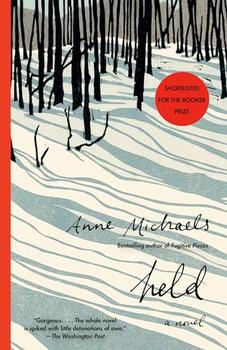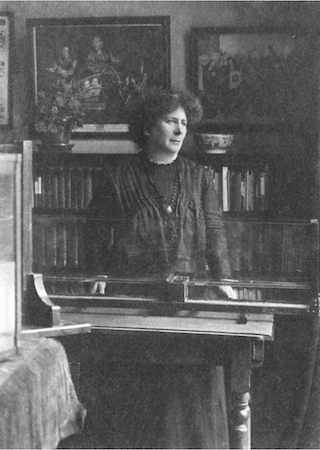Summary | Excerpt | Reading Guide | Reviews | Beyond the Book | Read-Alikes | Genres & Themes | Author Bio

A Novel
by Anne MichaelsThis article relates to Held
 The friendship between Hertha Ayrton and Marie Curie is explored in Anne Michaels's multigenerational novel Held. Although Marie Curie is a household name, Aryton's fascinating life is likely unfamiliar to most readers.
The friendship between Hertha Ayrton and Marie Curie is explored in Anne Michaels's multigenerational novel Held. Although Marie Curie is a household name, Aryton's fascinating life is likely unfamiliar to most readers.
Born in 1854 in Portsea, England, Hertha Ayrton was born as Phoebe Sarah Marks. Levi Marks, a clockmaker from Poland, had been forced to flee to England to escape anti-Semitic persecution. When he died in 1861, leaving his family in a significant amount of debt, his wife, seamstress Alice Theresa Marks, did her best to raise Phoebe Sarah, who at the time went by Sarah, and her six siblings (soon to be seven), but struggled under the pressure. At nine years old, Sarah went to live with Marion Hartog, her mother's sister, who raised and educated her alongside her own children.
As a teenager, Sarah adopted the name Hertha. The reasoning behind "Hertha" is unclear—some sources claim her name is derived from the earth goddess described in Algernon Swinburne's 1869 poem "Hertha," and others claim she named herself after the protagonist of Swedish writer Frederika Bremer's novel Hertha. It was at this time, in her teenage years under the tutelage of her aunt, that Hertha first discovered her passion for math and science.
In 1874, Hertha enrolled in Cambridge's Girton College, the first college for women in England, and studied mathematics. During this time she befriended George Eliot, who may have based the character Mirah Cohen in her 1876 novel Daniel Deronda on Hertha.
Although women were not eligible to graduate with a degree at the time, Hertha completed her studies at Girton College and went on to teach mathematics at a girls' school while pursuing her own research. In 1884, Hertha patented the line-divider, an instrument used in engineering and architecture for dividing a line into any number of equal parts. She would later go on to patent 25 more inventions in her lifetime.
Also in 1884, Hertha began studying at Finsbury Technical College, attending classes given by professor William Ayrton, a pioneer in electrical engineering, whom she went on to marry. She became the stepmother to Aryton's daughter, and a year later gave birth to her own daughter. Hertha assisted her husband with his research, which is when she made a significant discovery about electric arcs, about which she wrote several articles that went on to be published in the scientific journal The Electrician. She was the first woman to be elected as a member to the Institution of Electrical Engineers, as well as the first woman to be proposed to the fellowship of the Royal Society, though she was refused as the committee did not allow the admission of married women members.
William Ayrton died in 1908, but Hertha did not spend the later years of her life alone. She was an active member of her community, making many friends, one of whom was scientist Marie Curie. An active supporter of women's rights and women's suffrage, Hertha was one of Marie Curie's biggest champions. When Marie's discovery of radium was attributed to her husband, Pierre Curie, Hertha led a press campaign advocating for Marie to receive the proper attribution, stating, "errors are notoriously hard to kill, but an error that ascribes to a man what was actually the work of a woman has more lives than a cat."
During World War I, Hertha developed a hand-operated fan to get rid of mustard gas that was used in trenches. Though her invention was initially dismissed by the War Office, 104,000 "Ayrton Fans" would eventually be delivered to soldiers on the western front. She devoted the final years of her career to researching how to clear noxious vapors from mines and sewers. Hertha died of septicemia in 1923.
Hertha Ayrton stands in her home laboratory, where she conducted all her experiments, courtesy of Jewish Women's Archive
Filed under People, Eras & Events
![]() This "beyond the book article" relates to Held. It originally ran in March 2024 and has been updated for the
March 2025 paperback edition.
Go to magazine.
This "beyond the book article" relates to Held. It originally ran in March 2024 and has been updated for the
March 2025 paperback edition.
Go to magazine.
Education is the period during which you are being instructed by somebody you do not know, about something you do ...
Click Here to find out who said this, as well as discovering other famous literary quotes!
Your guide toexceptional books
BookBrowse seeks out and recommends the best in contemporary fiction and nonfiction—books that not only engage and entertain but also deepen our understanding of ourselves and the world around us.